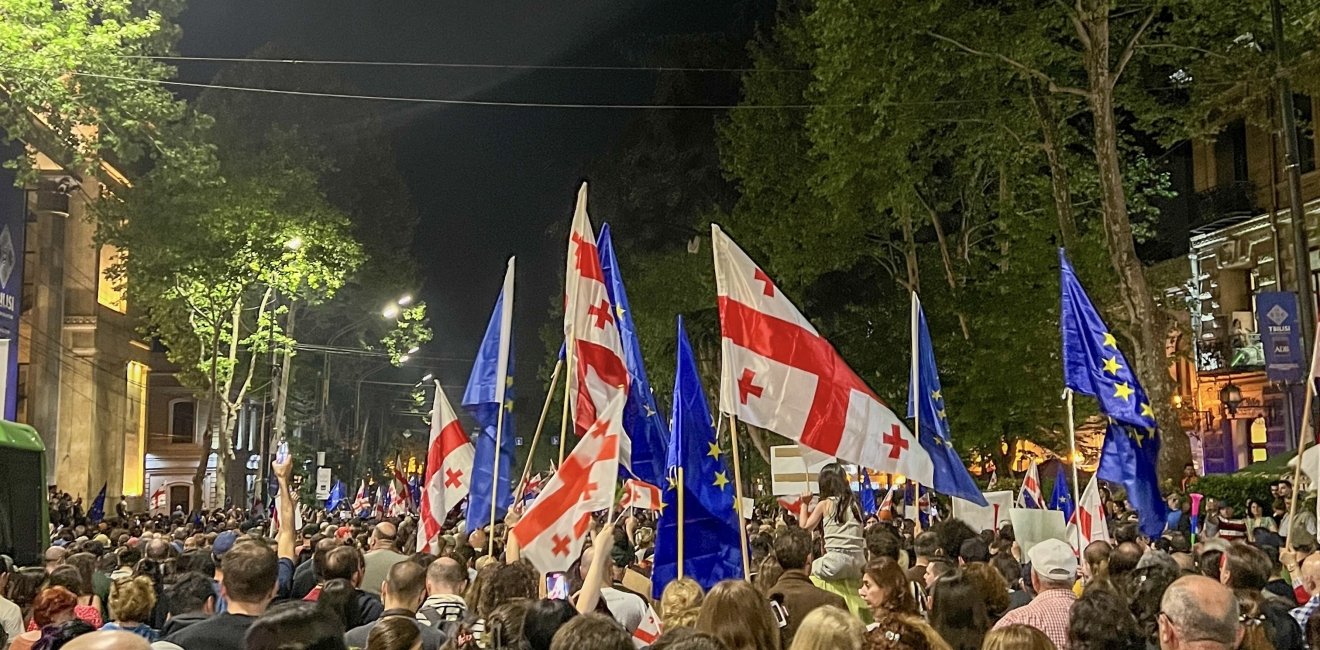Georgia, a republic once hailed as a democratic beacon in the South Caucasus and former Soviet space, was a front-runner in the European Union’s Eastern Partnership, known for its democratic changes and institutional transformation. However, it has recently drawn attention for democratic backsliding and the Kremlin’s “peaceful” political expansion.
From the beginning of its independence in 1991, Georgia's foreign policy has been closely aligned with the goal of achieving full membership in the EU. With EU’s support Georgia has made significant, albeit difficult, progress towards this goal. The pace of Georgia’s transformation accelerated after the “Rose Revolution” in 2003, which many Georgians see as the birth of a new state. Amid these significant institutional, social, and economic transformations, Georgia became the inaugural target of Putin’s imperial ambitions in August of 2008. This was not merely Moscow’s next military strike against Georgia but the first war on European soil since World War II—serving as a strategic blueprint for the Kremlin’s broader geopolitical appetite.
2012 marked another significant democratic shift for Georgia, as the country experienced its first-ever peaceful transfer of power through elections. This was a tremendous democratic milestone for the early-stage democracy. In October 2012, the political coalition “Georgian Dream”, led by billionaire Bidzina Ivanishvili with ties to Russia, defeated the former President's United National Movement (UNM) and took power. Initially, the power transition received positive feedback from Tbilisi's Western partners. Georgian Dream, which at the time united all leading pro-European political groups, gave no cause for concern about the nation's long-term Western-oriented foreign policy goals, including joining the EU and NATO.
However, things began to shift during Georgian Dream’s second term. The once multi-party coalition disintegrated, political polarization intensified, and the specter of informal, oligarchic governance reshaped the political landscape. Many observers began sounding the alarm over Georgian Dream’s potential pro-Russian turn and voiced concerns about the government’s increasingly anti-Western rhetoric long before it became mainstream. Despite signing the Association Agreement with the EU, starting visa-free travel to the Schengen area, and leading the EU's Eastern Partnership initiative, “Georgian Dream” and Ivanishvili began consolidating power. This included taking control of the judiciary, parliament, and the broader political system, while dismantling opposition forces and stifling dissent.
This shift became clear during Russia’s brutal war in Ukraine, as the Georgian government refused to implement most of the joint sanctions against Russia, allowed Russian airlines to continue flights to Georgian airports, and opened its borders to hundreds of thousands of Russian migrants and companies.
Despite signing the Association Agreement with the EU, starting visa-free travel to the Schengen area, and leading the EU's Eastern Partnership initiative, “Georgian Dream” and Ivanishvili began consolidating power. This included taking control of the judiciary, parliament, and the broader political system, while dismantling opposition forces and stifling dissent.
Such significant changes in foreign policy have not gone unnoticed within Georgia. Opinion polls show that around 80% of Georgians strongly support the country’s integration into the EU and NATO. Moreover, Georgia boasts a vibrant and robust civil society with extensive experience in Euro-Atlantic advocacy. This reality is well known to the Georgian government and the ruling party, which proposed a Russian-inspired foreign agent law—referred to simply as the “Russian Law” in Georgia—during the 2024 Spring parliamentary session aimed at eroding this civil society. Despite strong concerns from the EU, its member states, and the United States, the Georgian parliament, fully dominated by Ivanishvili’s ruling party, passed the law. The goal of the law was clear: to label, suppress, and ultimately dismantle civil society in Georgia. The government was moving steadily down a path toward authoritarianism.
However, Georgia's civil society remains far more resilient than Russia’s in resisting full control by an oligarch-backed authoritarian regime, especially one encouraged by the Kremlin. In the spring of 2023 and 2024, persistent, peaceful protests—the largest in Georgia’s history—have filled the streets of Tbilisi, inspired by a vision of a European future. These demonstrations faced several brutal crackdowns organized by special forces.
Many of Georgia’s friends abroad remain cautiously optimistic about the pro-European rallies in Tbilisi, particularly since they are being led by younger generations. This movement is not just about geopolitical issues but about a generational confrontation. Younger generations feel connected to Europe—they understand its values, having spent semesters at top European universities through Erasmus programs or traveled to Europe visa-free with their families. Many of them could be seen at the massive pro-European rallies, proudly asserting Georgia’s European future.
Georgia’s battle for democratic values and its dream of one day becoming a member of the EU is not confined to the minds of Georgians alone. The outcome of this struggle will have serious implications for the entire South Caucasus region. The recent tensions between Azerbaijan and Armenia have notably influenced Yerevan’s foreign policy toward Moscow. Russia’s perceived lack of support for Armenia in the Nagorno-Karabakh conflict has caused Armenia’s relations with Russia to deteriorate significantly, and Yerevan has begun taking steps toward closer ties with the EU. However, Armenia's geopolitical options are limited. If Georgia’s pro-European momentum falters, it could bolster Moscow's political influence in the region.
Georgia's fight to defend democratic values and stay on the European path is crucial not only for the country itself but also for the EU and its allies. For Brussels, Georgia’s trajectory holds significant geopolitical value. For over three decades, Georgia has been a key regional ally for both Brussels and Washington, having achieved critical milestones like signing an Association Agreement with the EU, obtaining EU candidate status, becoming a reliable NATO partner, and participating in military missions alongside NATO forces.
However, these European aspirations are now at risk. The Georgian government is on the verge of dismantling the political relationships with the West that have been carefully built over decades. This shift threatens to undermine Georgia's hard-won progress and jeopardize its European future.
Georgia’s battle for democratic values and its dream of one day becoming a member of the EU is not confined to the minds of Georgians alone. The outcome of this struggle will have serious implications for the entire South Caucasus region.
The parliamentary election set for Saturday, October 26, is a pivotal moment for Georgia. The ruling party, which has pledged to ban all opposition parties and charge its supporters if victorious, faces four opposition coalitions. They are informally led by current President Salome Zurabishvili, who has piloted the pro-European movement following massive rallies in the spring of 2024. The opposition’s key promise is straightforward: to put Georgia back on its Euro-Atlantic path and secure the nation’s European future. Now, around 2 million voters will decide at the ballot box whether the country continues its progress toward the EU or abandons its decades-long Euro-Atlantic course in favor of Kremlin-style authoritarianism and isolation.
The collapse of Georgia’s pro-European ambitions—after being the first target of Putin’s war machine in 2008 and a symbol of resistance against Russia—would be a significant victory for Moscow. It would signal the failure of a once-promising post-Soviet state to fulfill its centuries-old dream of joining the European community. And it would be a strategic loss for the west, as both the United States and EU have invested billions in aid to support institutional transformation, economic development, and civil society. It would hand a major victory to Putin, who has sponsored authoritarian regimes around the world, and derail Georgia’s European dreams.
Author


Global Europe Program
The Global Europe Program is focused on Europe’s capabilities, and how it engages on critical global issues. We investigate European approaches to critical global issues. We examine Europe’s relations with Russia and Eurasia, China and the Indo-Pacific, the Middle East and Africa. Our initiatives include “Ukraine in Europe”—an examination of what it will take to make Ukraine’s European future a reality. But we also examine the role of NATO, the European Union and the OSCE, Europe’s energy security, transatlantic trade disputes, and challenges to democracy. The Global Europe Program’s staff, scholars-in-residence, and Global Fellows participate in seminars, policy study groups, and international conferences to provide analytical recommendations to policy makers and the media. Read more

Explore More
Browse Insights & Analysis
Greenland’s New Governing Coalition Signals Consensus

The Future of France's Far-Right Party

Ukrainian Issue in Polish Elections

